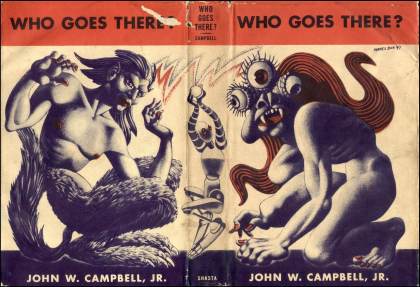T
If you love the John Carpenter version of The Thing and are dreading the remake coming to a theater near you, or if you just love stories that successfully represent a truly alien point of view, then you need to read Peter Watts' Hugo-nominated story "The Things." It's the John Carpenter flick, but from the point of view of what humans call "the thing" — a creature who has a hive mind, and knows no boundaries between itself and everyone else. Watts is the author of the novels Blindsight and Starfish, and "The Things" is one of the best stories you'll ever read by the master of scifi mindfuckery.
Here's how it starts:
I am being Blair. I escape out the back as the world comes in through the front.I am being Copper. I am rising from the dead.I am being Childs. I am guarding the main entrance.The names don't matter. They are placeholders, nothing more; all biomass is interchangeable. What matters is that these are all that is left of me. The world has burned everything else.I see myself through the window, loping through the storm, wearing Blair. MacReady has told me to burn Blair if he comes back alone, but MacReady still thinks I am one of him. I am not: I am being Blair, and I am at the door. I am being Childs, and I let myself in. I take brief communion, tendrils writhing forth from my faces, intertwining: I am BlairChilds, exchanging news of the world.The world has found me out. It has discovered my burrow beneath the tool shed, the half-finished lifeboat cannibalized from the viscera of dead helicopters. The world is busy destroying my means of escape. Then it will come back for me.There is only one option left. I disintegrate. Being Blair, I go to share the plan with Copper and to feed on the rotting biomass once called Clarke; so many changes in so short a time have dangerously depleted my reserves. Being Childs, I have already consumed what was left of Fuchs and am replenished for the next phase. I sling the flamethrower onto my back and head outside, into the long Antarctic night.I will go into the storm, and never come back.* * *I was so much more, before the crash. I was an explorer, an ambassador, a missionary. I spread across the cosmos, met countless worlds, took communion: the fit reshaped the unfit and the whole universe bootstrapped upwards in joyful, infinitesimal increments. I was a soldier, at war with entropy itself. I was the very hand by which Creation perfects itself.So much wisdom I had. So much experience. Now I cannot remember all the things I knew. I can only remember that I once knew them.I remember the crash, though. It killed most of this offshoot outright, but a little crawled from the wreckage: a few trillion cells, a soul too weak to keep them in check. Mutinous biomass sloughed off despite my most desperate attempts to hold myself together: panic-stricken little clots of meat, instinctively growing whatever limbs they could remember and fleeing across the burning ice. By the time I'd regained control of what was left the fires had died and the cold was closing back in. I barely managed to grow enough antifreeze to keep my cells from bursting before the ice took me.I remember my reawakening, too: dull stirrings of sensation in real time, the first embers of cognition, the slow blooming warmth of awareness as body and soul embraced after their long sleep. I remember the biped offshoots surrounding me, the strange chittering sounds they made, the odd uniformity of their body plans. How ill-adapted they looked! How inefficient their morphology! Even disabled, I could see so many things to fix. So I reached out. I took communion. I tasted the flesh of the world--and the world attacked me. It attacked me.I left that place in ruins. It was on the other side of the mountains-the Norwegian camp, it is called here-and I could never have crossed that distance in a biped skin. Fortunately there was another shape to choose from, smaller than the biped but better adapted to the local climate. I hid within it while the rest of me fought off the attack. I fled into the night on four legs, and let the rising flames cover my escape.I did not stop running until I arrived here. I walked among these new offshoots wearing the skin of a quadruped; and because they had not seen me take any other shape, they did not attack.And when I assimilated them in turn-when my biomass changed and flowed into shapes unfamiliar to local eyes-I took that communion in solitude, having learned that the world does not like what it doesn't know.
Read the original story Here


Saw this & thought it be a Gygiaxian biological example & one from the monster's perspective. In case your interested in the original pulp story of Who Goes There Here it is Which is the Campbell's short-story !


Saw this & thought it be a Gygiaxian biological example & one from the monster's perspective. In case your interested in the original pulp story of Who Goes There Here it is Which is the Campbell's short-story !
Actually with the mention of Norwegians and what not, it seems to be the movie version rather than Campbell's short-story. Still cool though. :)
ReplyDeleteYeah but what I didn't get to type was the tale that inspired was available here. Weird day as well so missed this. Corrected now! Thanks for the comment & the heads up! Stay tuned there's more to come!
ReplyDelete